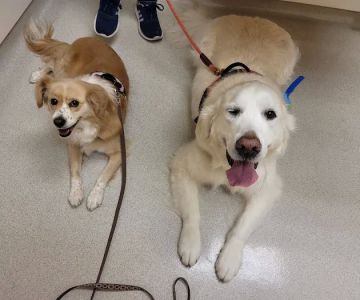What is a Companion Animal Veterinarian? Understanding Their Role in Pet Care
As a pet owner, you may have come across the term "companion animal veterinarian," but you might not be entirely sure what it entails. Having been a passionate pet parent for years, I found myself asking the same question. When my dog needed medical attention, I realized just how important it is to understand the role of a companion animal veterinarian and how they differ from other types of veterinarians. In this article, I’ll walk you through what exactly a companion animal veterinarian is, their role in pet health, and why they are crucial in maintaining your pet’s well-being.

3809 N Armenia Ave, Tampa, FL 33607, USA
See Details1. Defining a Companion Animal Veterinarian
To start, a companion animal veterinarian is a veterinarian who specializes in the care of pets—specifically dogs, cats, birds, and other small animals that are kept as companions. These professionals are experts in diagnosing and treating a wide range of health conditions that affect pets. Unlike veterinarians who may work with livestock or exotic animals, companion animal veterinarians are focused on animals that share homes with people, offering care for both routine health maintenance and emergency situations. This specialized focus on companion animals allows these veterinarians to build a deep understanding of the health and emotional needs of pets.
1.1. The Training and Qualifications of Companion Animal Veterinarians
Becoming a companion animal veterinarian requires extensive education and training. Just like any other veterinarian, companion animal vets must complete a bachelor’s degree, followed by a Doctor of Veterinary Medicine (DVM) program. These programs take years of rigorous study, covering topics like animal anatomy, disease prevention, and surgery. After graduation, these veterinarians must also pass national and state exams to become licensed to practice. Some companion animal veterinarians may even choose to pursue additional certifications or specialties in areas like surgery, dermatology, or cardiology to further enhance their expertise in caring for pets.
1.2. What Makes Companion Animal Veterinarians Different?
What sets companion animal veterinarians apart is their dedication to the health and well-being of pets. These veterinarians are trained not only to treat animals but also to understand the emotional bond between owners and their pets. They focus on the physical, emotional, and psychological needs of pets, which often include addressing issues such as separation anxiety, behavioral concerns, and preventive health care. This holistic approach to animal care ensures that pets receive the best possible attention, helping them lead happy and healthy lives.
2. The Role of a Companion Animal Veterinarian
When it comes to your pet’s health, the companion animal veterinarian plays an essential role in keeping your furry friend happy and safe. From routine check-ups to more complex medical procedures, these veterinarians are your go-to experts for all pet health needs. I’ll share some of the key responsibilities of a companion animal veterinarian that are vital to the well-being of your pet.
2.1. Preventative Health Care
One of the main responsibilities of a companion animal veterinarian is providing preventive health care. Just like humans, pets need regular check-ups to monitor their health and prevent illnesses. During annual or semi-annual visits, your companion animal veterinarian will perform a thorough physical examination, check for signs of disease, administer vaccinations, and offer parasite prevention (like flea, tick, and worm treatments). These visits are crucial for maintaining the overall health of your pet and catching any potential problems early. I personally noticed how important it was for my pet’s longevity to keep up with preventive care, as it ensured that he stayed healthy and happy for years.
2.2. Diagnosing and Treating Illnesses
Despite our best efforts at preventive care, pets can still fall ill or get injured. Companion animal veterinarians are equipped with the knowledge and tools to diagnose and treat a variety of conditions. Whether it’s something as common as a cold or more serious conditions like kidney disease or cancer, these veterinarians have the expertise to offer the right treatments and solutions. I remember when my dog had a mysterious issue with his digestive system; our companion animal veterinarian was able to quickly diagnose the problem and recommend a treatment plan that worked, getting him back to his energetic self in no time.
2.3. Specialized Treatments and Emergency Care
Another important aspect of a companion animal veterinarian’s role is providing specialized treatments, including surgeries, dentistry, and emergency care. Many companion animal veterinarians have the expertise to perform routine surgeries, such as spaying and neutering, as well as more complex procedures, like orthopedic surgeries or tumor removals. In emergencies, these veterinarians are often available to provide immediate care, ensuring your pet gets the attention they need when they need it most. I’ve been fortunate to have a companion animal veterinarian who was able to handle an emergency situation with my dog, saving him from a potentially serious condition.
3. Why You Should Choose a Companion Animal Veterinarian
Choosing the right veterinarian for your pet is a crucial decision, and selecting a companion animal veterinarian can provide numerous benefits for both you and your pet. I’ve found that having a vet who specializes in companion animals gives me peace of mind, knowing that my pet is getting the most expert care possible. Whether you have a dog, cat, or exotic pet, companion animal veterinarians offer specialized knowledge that ensures your pet’s needs are met at every stage of their life.
3.1. Expertise in Common Pet Issues
Companion animal veterinarians are specifically trained to deal with the health concerns that are unique to pets. This expertise allows them to offer targeted treatments for common issues like skin allergies, dental disease, and obesity. Having a veterinarian who understands the intricacies of your pet’s health is invaluable when it comes to providing long-term care. With my own pets, I’ve found that working with a companion animal veterinarian has helped me stay on top of common health issues, ensuring they lead healthy and happy lives.
3.2. Building a Stronger Relationship with Your Pet
Choosing a companion animal veterinarian means building a relationship with someone who understands not just your pet’s health but their temperament and behavior. This is especially important for pets who may have anxiety or behavioral issues. A compassionate veterinarian who knows your pet well can help create a personalized care plan that addresses their specific needs. I’ve seen how this type of relationship can lead to more comfortable and successful visits, which reduces the stress for both the pet and the owner.
4. The Future of Companion Animal Care
The field of companion animal care is constantly evolving. With advancements in veterinary medicine and technology, companion animal veterinarians are now able to provide even more effective treatments and solutions. For example, new diagnostic tools like advanced imaging, genetic testing, and robotic surgery are improving outcomes for pets with serious conditions. In the future, I believe we’ll continue to see more innovative treatments and a deeper understanding of animal health, which will only enhance the care pets receive from companion animal veterinarians.
4.1. Innovative Approaches to Pet Health
As veterinary medicine continues to advance, companion animal veterinarians will play a critical role in integrating new technologies and approaches into pet care. This includes using telemedicine for remote consultations, incorporating holistic treatments, and using advanced pain management techniques. The future of companion animal care looks bright, with more personalized and accessible care for pets and their owners.
Overall, a companion animal veterinarian is an essential part of your pet’s life. They provide expert care and support for a range of health needs, from preventive measures to emergency treatment. If you’re looking for a trusted veterinary professional who understands the unique needs of your pet, a companion animal veterinarian is the best choice for your furry, scaly, or feathered friend. To learn more about companion animal care or find the right veterinarian for your pet, visit Hidden Brook Veterinary for helpful resources and guidance.










